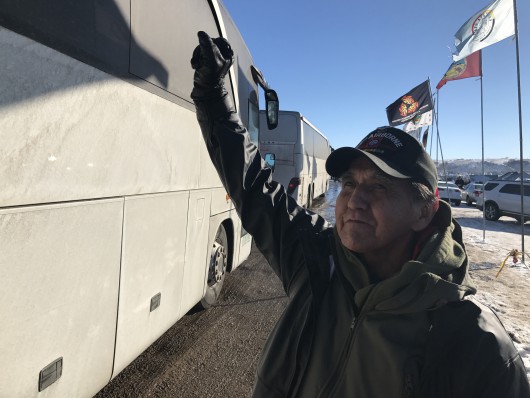
Willard Jackson is seen as busloads of veterans arrive at Standing Rock on Sunday, Dec. 4. (Photo by Daysha Eaton)
This past week, thousands of Standing Rock demonstrators left the main camp in opposition against the Dakota Access Pipeline, Oceti Sakowin, but hundreds have vowed to stay.
Willard Jackson Sr. of Ketchikan, was there when the U.S. Army Corps of Engineers announced it had denied a key easement for completion of the pipeline.
Near the bridge where police shot rubber bullets and used fire hoses to spray demonstrators in below freezing temperatures in November, Veterans gathered on Dec. 5 to march with tribal flags.
Willard S. Jackson Sr., Tlingit, from Ketchikan was among them. They were there to show support for the Standing Rock Sioux Tribe in their fight against the Dakota Access Pipeline. As the 69-year-old marched through a snowstorm just above the camp he was interviewed by a TV news crew, and was asked: “Do you consider the fact that the Army Corps of Engineers did not grant the easement and the pipeline company is going to continue working anyway—is that simply another broken treaty?”
“Treaties across this land of United States, including in Alaska have been broken,” Jackson replied. “They are just trying to protect the land for their grandchildren.”
Jackson, along with the thousands of other veterans, who gathered at Standing Rock last week, worry a pipeline accident could threaten the water supply of the tribe and millions of others downstream. The tribe also said construction is destroying sacred sites. Jackson said he felt the call to join the demonstration.
“I’m Tlingit. I’m from … brown bear. I was in Vietnam ’68, ’69 with the 82nd Airborne …”
Jackson said he also came here to pray.
“My purpose of being here at this camp is to pray for Mother Earth,” he said. “The 10,000-plus that are here, including the veterans, will do the other prayers as needed. I come to pray for Mother Earth because we’re disturbing it. And when we disturb Mother Earth it also affects us as a human being. Not just Alaska Native/American Indians—it affects everybody.”
Energy Transfer Partners wants to drill under the Missouri River to complete a pipeline that would ship crude oil across four states.
Supporters of the tribe have been occupying Army Corps land along the path of the pipeline since April, claiming tribes are the rightful owners under an 1851 treaty.
Dec. 4 the Army Corps announced the denial of a key easement that Energy Transfer Partners needs to drill under the Missouri to complete the pipeline.
Despite a huge snowstorm on the day of the veteran’s march, the event went on as planned.
When the announcement was made that the easement had been denied, Jackson said many at the camp, including veterans, were in disbelief.
Jackson said there was a sense of relief in the camp, but many are skeptical.
“I’m not going to tell you it was a win,” he said. “[It] was a day of relief because the vets came in. They didn’t have to demonstrate or go up to the line, to the bridge. We’ve done ceremonies up there. I [have] done a few songs, said a prayer.”
 Jackson decided to come to the camp after he heard about it from his nephew, David Guthrie, who has been living at the camp in a small tent for months. Jackson visited his nephew’s camp – where he is in the process of building a shelter.
Jackson decided to come to the camp after he heard about it from his nephew, David Guthrie, who has been living at the camp in a small tent for months. Jackson visited his nephew’s camp – where he is in the process of building a shelter.
“Last night it was 17 degrees and it’s getting colder,” he said. “This was built by three of them and it is all done by hand. Beautiful little Hogan here. Once they get it complete you can feel the ground is dry, they’ll stay warm. He’s been living in that little tent for three months.”
Now, it’s getting even colder at the camp, dropping into the single digits and below zero with the wind chill. The camp is in transition. This past week, thousands of demonstrators left the camp and Standing Rock Sioux Tribal Chairman, Dave Archambault, asked campers to leave for their own safety. Camp leaders also closed the camp to new arrivals but told established campers they could remain. Jackson’s nephew is among those staying.
Jackson said he’s looking forward the next chapter in the story of the fight against the Dakota Access Pipeline.
“I don’t think this is over yet,” he said. “What I do believe it is the beginning.”
That will likely play out in the courts. A federal court hearing to decide whether the company building the pipeline can expedite their work to complete construction under the Missouri River, despite denial of the easement, is set for the new year.






